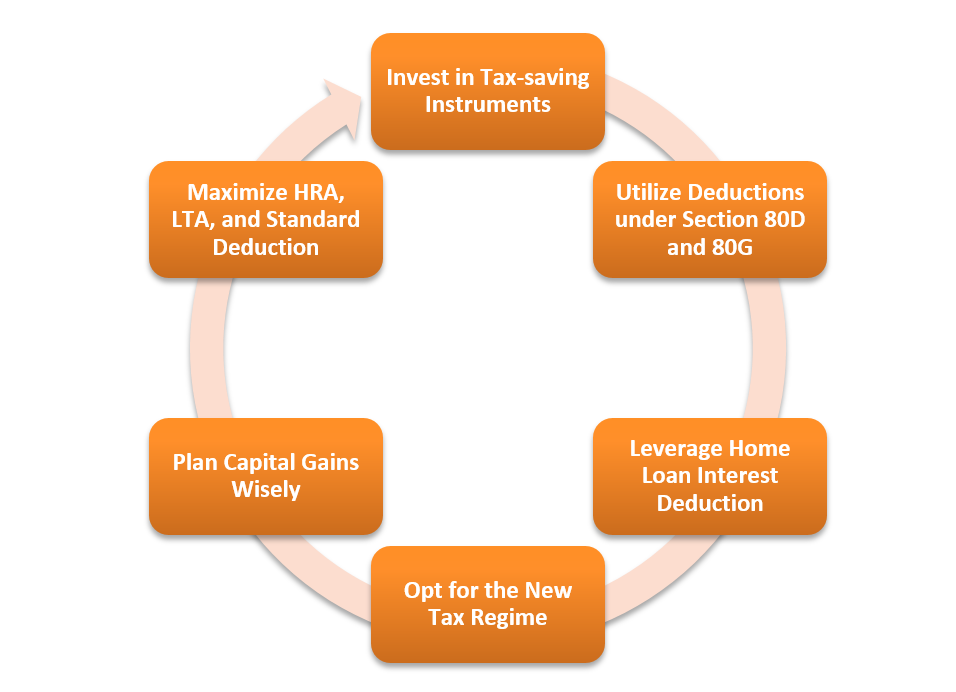
It is a Saying that “There is nothing certain except Death and Taxes” After the completion of Financial Year 2022- 2023, now taxpayers are looking ahead to plan to save their taxes in the next coming financial year, that is in Financial Year 2023- 2024. For this Income Tax Planning plays an important role that helps tax payers saving their taxes, with careful analyses of these tax planning strategy one can eventually help tax payer in saving their taxes. Section 80C of Income Tax Act, 1961 is one of the most crucial provisions in the tax management. In this article, we will try to give an answer on question that many tax payer have, i.e., How to Save Income Tax in FY 2023-24?
Before we move on to answer the question on How to Save Income Tax in FY 2023-24?, let us discuss about Tax Planning first, as it forms an integral part in saving considerable taxes. By understanding the importance of Tax Planning one can connect with Tax Experts as they can help you save income taxes.
| Table of Content |
Meaning Tax Planning
Tax planning is not the same as tax evasion, which is unlawful and can result in significant penalties and consequences. Tax planning, on the other hand, is completely legal and encourages individuals to take advantage of any tax advantages. It is about reducing tax liabilities by legal means and provisions in tax laws.
Tax planning is an important component of personal finance since it helps people to reduce their tax burden while increasing their disposable income. Section 80C of the Income Tax Act, 1961, which allows deductions of up to 1.5 lakhs from gross total income, has long been a favorite tax-saving avenue for many taxpayers.
Importance of Tax Planning for saving your Taxes
The following are the importance of Tax Planning for saving on your taxes:
- Legal Compliance: The Income Tax Act, 1961 lays down rules and regulations that taxpayers must keep in mind. Proper tax planning makes sure that you are in compliance with tax laws. Proper tax planning ensures avoidance penalties that might arise from incorrect income tax filings.
- Reduced Tax Liability: Tax planning enables individuals and businesses to take benefits of available deductions and exemptions. By proper investments and applying various provisions regarding tax deduction, taxpayers can lower their tax liability and therefore, the reduction in the overall tax obligation.
- Financial Goal Achievement: Effective tax planning assists you in achieving your financial goals. Whether you’re saving for your child’s higher education, your retirement, or for buying a house, channelizing your investments in a tax-efficient manner can help you to achieve your financial objectives.
- Accumulation of Wealth: By appropriate tax planning one can accumulate wealth or money in form of savings. By keeping in mind the tax implications of inheritance and gift taxes, taxpayer can make sure that their wealth is transferred to their generations smoothly and with less tax obligations.
- Investment Strategy: Tax planning also impacts your investment strategy. Making informed decisions about when and where to invest, to keep in mind factors like capital gains taxes and dividend taxes, one can improve returns gains.
Also read our Article on: Tax Planning for Individuals under Income Tax Act, 1961
How to Save Income Tax in FY 2023-24?
By keeping in mind some tax saving investment schemes below one can save the Income Tax in Financial Year 2023-2024:

- Invest in Tax-saving Instruments : One of the common and efficient ways to save income tax in India is by investing your money in tax-saving options available under Section 80C of the Income Tax Act, 1961. This section deals with deductions upon investments made in various instruments, such as:
- Public Provident Fund (PPF)
- Employee Provident Fund (EPF)
- National Savings Certificate (NSC)
- Tax-saving Fixed Deposits
- Equity-Linked Savings Schemes (ELSS)
- Senior Citizens Savings Scheme (SCSS)
- 5-year Fixed Deposit in banks and post offices
Taxpayers are eligible to claim deductions up to ₹1.5 lakh by investing in schemes under Section 80C. It is important for tax payer to carefully analyze your investment need and risk tolerance before opting for the appropriate instruments.
- Utilize Deductions under Section 80D and 80G: Under Section 80D of Income Tax Act, 1961, taxpayers are eligible to avail deductions for the premiums paid by them in lieu of health insurance policies for themselves, their spouse, children, and parents. Additionally, donations made by taxpayer to Charitable Trust, NGO’s etc also make him eligible under Section 80G for claiming tax deduction.
- Leverage Home Loan Interest Deduction: A per, Section 24(b) of Income Tax Act, 1961, homeowners can save income tax by way of claiming deductions on the interest paid by them on their home loans. Also, under Section 80EEA of Income Tax Act, 1961, first-time homebuyers are eligible to claim an additional deduction on interest up to ₹1.5 lakh, upon fulfillment of certain conditions.
- Opt for the New Tax Regime: From FY 2020-21 onwards, taxpayer can choose between the old tax regime with deductions and exemptions and between the new tax regime with reduced tax rates. Depending on your income and the deductions you often claim, it is important to calculate appropriate regime beneficial for you, so that you could avail maximum benefits and for maximum reduction in taxable liabilities.
We have provided difference of tax slab rate between Old and New Tax Regime provided by the Income Tax Department, analysis of which could help you in achieving your financial goal and to save your taxes for the Financial Year 2023-2024.Old Tax Slabs Old Income Tax Rates New Tax Slabs New Income Tax Rates Upto Rs 2.5 lakh NIL Upto Rs 3 lakh NIL Rs 2.5 – Rs 5 lakh 5% Rs 3 lakh – Rs 6 lakh 5% Rs 5 – Rs 10 lakh 20% Rs 6 lakh – Rs 9 lakh 10% Above Rs 10 lakh 30% Rs 9 lakh – Rs 12 lakh 15% Rs 12 lakh – Rs 15 lakh 20% Above Rs 15 lakh 30%
- Maximize HRA, LTA, and Standard Deduction: Salaried individuals can save taxes through House Rent Allowance (HRA), Leave Travel Allowance (LTA), and the Standard Deduction available to them. Tax payer must ensure that they have provided accurate documents for claiming of these allowances and deductions.
- Plan Capital Gains Wisely: In case the taxpayer have capital gains yield from the sale of assets such as property or stocks, then he/she should consider reinvesting them in specified instruments like Capital Gains Bonds or another property to claim tax exemptions under Section 54 and Section 54F, respectively.
Conclusion
Saving income tax or moving with tax saving investments in India requires a strategic approach that must be in line with both your financial goals and applicable tax laws, i.e., Income Tax Act, 1961. By understanding and using the various deductions and exemptions, taxpayers can efficiently reduce their tax burden and may enhance their overall financial well-being.
However, it’s pertinent to note that tax planning should always be done with the assistance of Tax Experts. For effective tax management or Tax Planning connect with our experts at Legal Window, they are equipped with latest information and recent amendments in tax laws. They could assist you in timely filing of Income Tax Return and may also, assists you in financial planning to save your taxes.
CA Pulkit Goyal, is a fellow member of the Institute of Chartered Accountants of India (ICAI) having 10 years of experience in the profession of Chartered Accountancy and thorough understanding of the corporate as well as non-corporate entities taxation system. His core area of practice is foreign company taxation which has given him an edge in analytical thinking & executing assignments with a unique perspective. He has worked as a consultant with professionally managed corporates. He has experience of writing in different areas and keep at pace with the latest changes and analyze the different implications of various provisions of the act.
Categories
- Agreement Drafting (23)
- Annual Compliance (11)
- Change in Business (36)
- Company Law (148)
- Compliance (90)
- Digital Banking (3)
- Drug License (3)
- FEMA (17)
- Finance Company (42)
- Foreign Taxation (6)
- FSSAI License/Registration (14)
- GST (118)
- Hallmark Registration (1)
- Income Tax (200)
- Latest News (34)
- Miscellaneous (164)
- NBFC Registration (8)
- NGO (14)
- SEBI Registration (6)
- Section 8 Company (7)
- Start and manage a business (21)
- Startup/ Registration (130)
- Trademark Registration/IPR (40)
Recent Posts
- NGO Darpan Registration in Jaipur May 2, 2024
- Registration of Charges with ROC May 1, 2024
- Post incorporation compliances for companies in India April 30, 2024
About us
LegalWindow.in is a professional technology driven platform of multidisciplined experts like CA/CS/Lawyers spanning with an aim to provide concrete solution to individuals, start-ups and other business organisation by maximising their growth at an affordable cost.








